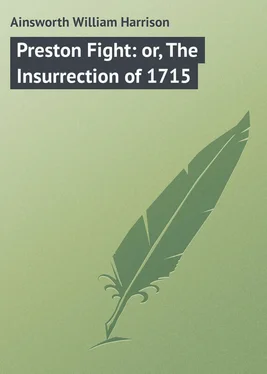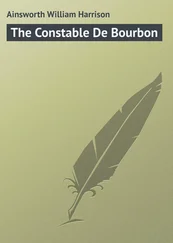William Ainsworth - Preston Fight - or, The Insurrection of 1715
Здесь есть возможность читать онлайн «William Ainsworth - Preston Fight - or, The Insurrection of 1715» — ознакомительный отрывок электронной книги совершенно бесплатно, а после прочтения отрывка купить полную версию. В некоторых случаях можно слушать аудио, скачать через торрент в формате fb2 и присутствует краткое содержание. ISBN: , Жанр: foreign_prose, на английском языке. Описание произведения, (предисловие) а так же отзывы посетителей доступны на портале библиотеки ЛибКат.
- Название:Preston Fight: or, The Insurrection of 1715
- Автор:
- Жанр:
- Год:неизвестен
- ISBN:http://www.gutenberg.org/ebooks/49851
- Рейтинг книги:4 / 5. Голосов: 1
-
Избранное:Добавить в избранное
- Отзывы:
-
Ваша оценка:
- 80
- 1
- 2
- 3
- 4
- 5
Preston Fight: or, The Insurrection of 1715: краткое содержание, описание и аннотация
Предлагаем к чтению аннотацию, описание, краткое содержание или предисловие (зависит от того, что написал сам автор книги «Preston Fight: or, The Insurrection of 1715»). Если вы не нашли необходимую информацию о книге — напишите в комментариях, мы постараемся отыскать её.
Preston Fight: or, The Insurrection of 1715 — читать онлайн ознакомительный отрывок
Ниже представлен текст книги, разбитый по страницам. Система сохранения места последней прочитанной страницы, позволяет с удобством читать онлайн бесплатно книгу «Preston Fight: or, The Insurrection of 1715», без необходимости каждый раз заново искать на чём Вы остановились. Поставьте закладку, и сможете в любой момент перейти на страницу, на которой закончили чтение.
Интервал:
Закладка:
“For what reason?” demanded Lord Derwentwater in surprise.
“He gives no reason,” rejoined the prince. “But Lord Mar knows the feeling of the clans, and evidently deems the present juncture unpropitious to a rising.”
“I cannot tell what may be the state of the clans,” said Lord Derwentwater, scarcely able to repress his impatience; “but I am certain the opportunity is favourable in the North of England – as can soon be shown, if your majesty will give the signal.”
“I will not commit myself to any decisive step now, my lord,” said the prince, who when thus urged, seemed to shrink from the enterprise. “Nor do I think it will be prudent for me to remain here long.”
“What danger does your majesty apprehend?” cried the earl. “All are devoted to you. There are no traitors in the castle.”
“But I have many enemies in the country, and the Earl of Mar bids me ‘beware,’” said the prince.
“We will defend you against your enemies, my liege,” said Lord Derwentwater. “You need not fear them. Immediate preparations shall be made.”
“No haste is needful, cousin,” said the prince. “I have a strong guard enough,” he added, glancing at Colonel Oxburgh and his friends, who were standing at a little distance. “Let the day pass tranquilly – if it will. To-morrow we will consider what shall be done.”
“Heaven grant your majesty may change your mind in the interim!” observed Anna.
“If you exercise your powers of persuasion, fair lady, there is no saying what you may accomplish,” said the prince, gallantly.
At this moment a bell was heard, and Newbiggin came forth with two other servants in livery, and respectfully announced breakfast.
The prince offered his hand to Anna and led her to the house, and the rest of the party followed.
XIII. – THE BETROTHAL
A profuse breakfast, served in the good old style, awaited them in the dining-room. The sideboard groaned with the weight of huge cold joints, hams, tongues, and pasties; and broiled trout and salmon in abundance appeared on the table. How many good things there were besides in the shape of cutlets and omelettes, we cannot tell, but nothing seemed wanting. Chocolate was handed to the ladies, but claret suited the gentlemen best, though in some instances a flagon of strong ale was preferred.
Breakfast over, the ladies withdrew to prepare for the ceremony appointed to take place in the chapel, while the prince again walked forth on the terrace, in company with Lord Derwentwater and Sir John Webb, and gazed with fresh delight at the prospect.
Colonel Oxburgh and his companions, with Tom Forster, adjourned to the stables. There was a good deal of conjecture among them as to the prince’s plans, which now seemed quite undecided; but they came to the conclusion that no rising would take place. At the same time, they all rejoiced that the hazardous – and as they deemed it useless – journey to London had been abandoned.
“Something ought to be done,” cried Forster. “But it puzzles me to say what.”
“Have patience,” said Colonel Oxbugh. “Depend upon it we shan’t remain long idle. His majesty will be forced to make a move of some kind.”
Long before the hour appointed for the betrothal, the little chapel was filled. All the household craved permission to witness the ceremony, and none were refused. The guests entered at the same time, and found places where they could. But little room was left, as may be imagined, when all these persons were accommodated. In the large pew were the prince with Charles Radclyffe, Mr. Forster and his sister – the latter looking bright and blooming as usual.
Lord Derwentwater was standing at the door of the little edifice in momentary expectation of the arrival of her to whom he was about to be affianced. She came, leaning on her father’s arm, and attended by her mother – not decked in bridal attire – not draped in a bridal veil – for such adornments would have been unsuitable to the occasion, but arrayed in a charming costume of azure satin and lace.
After salutations had passed, Sir John Webb consigned his lovely daughter to the earl, and followed them with Lady Webb.
An irrepressible murmur of admiration burst forth as the youthful pair moved towards the altar, where they immediately knelt down, and a group was formed behind them of which the prince was the principal figure – his highness having come with the others from the pew.
Not till a prayer was recited could the spectators obtain a glimpse of the scene at the altar, and if this was quickly hidden from their sight they heard the vow pronounced that bound the pair together, and they likewise heard Father Norham’s benediction.
Those near the altar saw the earl embrace his affianced bride as they rose together, and some of them remarked that she looked strangely pale. Only for a minute, for her colour quickly returned. The prince, however, noticed the circumstance, and so did Dorothy. But both attributed it to deep emotion.
Nothing whatever marred the ceremony, the sole fault of which, in the opinion of the majority of those present, was that it was too brief.
Several of the household grouped themselves on either side of the path leading to the gate to offer their good wishes to the newly-affianced pair as they passed by. Among these were old Nicholas Ribbleton, and an elderly dame who, like himself, had lived in the family for years.
“Eh! she’s a bonnie lass!” cried this old woman, after scrutinising her sharply. “But I doubt if she’ll make his lordship happy. He had better have chosen Dorothy F orster.”
“Why, what ails her?” said Ribbleton.
“I cannot exactly tell – but there’s a look about her I don’t like.”
“Well, it’s too late to change now, Grace,” observed Ribbleton. “The troth is plighted.”
“Ay, that’s the worst of it,” rejoined the old woman. “But a time may come, when his lordship will wish what’s done were undone.”
This was the only discordant note uttered, and it reached no other ear but Ribbleton’s, and him it made angry. So he walked off, and left the old prophetess of ill to herself.
XIV. – THE SPY
T he rest of the day was spent in festivity and amusement.
Lord Derwentwater and his affianced bride did not stray beyond the garden, and seemed so perfectly happy in each other’s society that no one went near them.
The prince explored the mysterious glen, and Charles Radclyffe acted as his guide, introducing him to all the beauties of the place, and relating all the legends connected with it. A large party accompanied his highness, including Lady Webb and Dorothy Forster – the latter of whom had often seen the place before, but was quite as much enchanted with it as ever.
The visit to this picturesque dell, which has been previously described, occupied some time, for there was a great deal to be seen. But neither the prince, nor any of those with him, were aware that, while they were tracking the course of the Devil’s Water over its rocky channel, or standing near the pool, they were watched by a person concealed amid the brushwood on its banks.
This person was an emissary of Sir William Lorraine, of Bywell Park, high sheriff of the county, and a strong supporter of the Government. That very morning, Sir William had received the astounding information that the Pretender had arrived at Dilston Castle, and that a rising in his favour was imminent among the gentlemen of the county; but as the news came from a suspicious source, the high sheriff, though alarmed, did not entirely credit it, and, before taking any active measures – such as raising a posse-comitatus, or calling out the militia – he determined to send a couple of spies to Dilston to ascertain the truth of the report.
Читать дальшеИнтервал:
Закладка:
Похожие книги на «Preston Fight: or, The Insurrection of 1715»
Представляем Вашему вниманию похожие книги на «Preston Fight: or, The Insurrection of 1715» списком для выбора. Мы отобрали схожую по названию и смыслу литературу в надежде предоставить читателям больше вариантов отыскать новые, интересные, ещё непрочитанные произведения.
Обсуждение, отзывы о книге «Preston Fight: or, The Insurrection of 1715» и просто собственные мнения читателей. Оставьте ваши комментарии, напишите, что Вы думаете о произведении, его смысле или главных героях. Укажите что конкретно понравилось, а что нет, и почему Вы так считаете.












